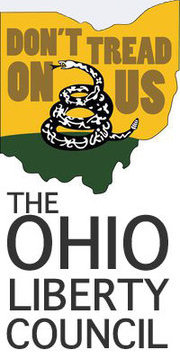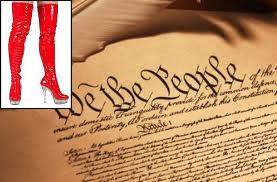Podcast: Play in new window | Download
There is currently a movement in the United States that is gaining a disturbing momentum. The leaders of the movement are agitating state governments to petition Congress to call a new constitutional convention. While groups on the left have been demanding a new convention for the purpose of re-writing the existing Constitution for decades the current calls are coming from groups that most would place in the “conservative” category. The liberal groups are calling straightforwardly for a convention with plenipotentiary constitution making authority while the conservative elements are calling for a convention limited by charter for the purpose of amending the existing Constitution. While the latter sounds reasonable it is the opinion of the Institute For Principled Policy, not on our own authority but based on extensive research on the legal, historical, and procedural precedents set by conventions of the United States, colonial America, and Great Britain, that the chartering of a so-called controlled or “shackled” constitutional convention will have the same result as the calling of a convention with plenipotentiary authority. That predicted result in either case is a new constitution. Based on further research into existing constitutional models, parts which are already being implemented, we believe that the government created by any new constitution will be divorced from both the bedrock philosophical moorings laid out in the Declaration of Independence and from the shackles imposed by the current constitution. In this light the Hegelian Dialectical nature of the debate over a new constitutional convention is exposed.
In this series we will present the case and documentation that are the foundation our positions.
_______________________________________________________
 “I don’t know what you mean by ‘glory,’ †Alice said.
“I don’t know what you mean by ‘glory,’ †Alice said.
Humpty Dumpty smiled contemptuously. “Of course you don’t—till I tell you. I meant ‘there’s a nice knock-down argument for you!’ â€
“But ‘glory’ doesn’t mean ‘a nice knock-down argument’,†Alice objected.
“When I use a word,†Humpty Dumpty said, in a rather a scornful tone, “it means just what I choose it to mean—neither more nor less.â€
“The question is,†said Alice, “whether you can make words mean so many different things.â€
“The question is,†said Humpty Dumpty, “which is to be master that’s all.â€
Alice was too much puzzled to say anything, so after a minute Humpty Dumpty began again. “They’ve a temper, some of them—particularly verbs, they’re the proudest—adjectives you can do anything with, but not verbs—however, I can manage the whole lot! Impenetrability! That’s what I say!†–Humpty Dumpty in Alice Through The Looking Glass
Why all the questions?
In the previous section we posited that there are important questions that must be answered and the answers confirmed. All of the questions pivot around the necessity of a new convention, the historical and procedural precedents set during previous conventions, and parliamentary rules and procedures. You will find that some of the questions asked here have purportedly been answered by one or another of the pro-convention advocacy groups and think tanks. Our contention is that the answers to the questions do not hold up to close examination and must be rejected. And this is where much of the problem discussed earlier lies. The answers given have been taken at face value because the people asking the question have trusted the organizations supplying the answers. And in some cases that trust has been misplaced, with the result being the magnification and propagation of spurious information about the controllability of certain types of conventions.
In researching the answers to these questions we have encountered much scholarship both American and European and spanning the period from the 17th century to the present. Some of the scholarship we examined, especially from the 20th century, contains subtle arguments based on claims of special knowledge of the meaning of key words and phrases from 18th century documents. Much of the argumentation that grows out of the historical evidence is therefore subject to interpretation. And because the interpretation can be based on specialized knowledge, it is also subject to equivocation regarding the meanings of words and phrases to support the case that the writer is working to build.
Words have meaning- and why that matters.
For an illustration of this principle the reader is invited to read and compare Joseph Story’s Commentaries On The Constitution of The United States with Abel P. Upshur’s A Brief Enquiry Into The True Nature And Character Of Our Federal Government, John Taylor of Caroline’s New Views of the Constitution of the United States, and St. George Tucker’s View of the Constitution of the United States. In these 4 volumes, all based on the same basic set of documents and historical facts, the authors draw very different conclusions regarding the original intent of the framers of the Constitution on the subject of the nature of the government created by it. Story (and to a lesser extent commentators like William Rawle in his View of the Constitution of the United States) take a position that the Constitution created a sovereign national government, in effect arguing that not only did the states not retain sovereignty but that they never actually had it, sovereignty having passed from the British Crown directly onto a single united entity in the body of “the people,†the states being mere organizational and administrative entities. Upshur, Taylor, and Tucker all argue that under the polity created by the Constitution the states retain full sovereignty except that which they have voluntarily ceded to a federal government limited by charter for the purpose of presenting a united defense, diplomacy and trade posture to a hostile world. Upshur and Taylor’s works were actually written as direct refutations of the basic premises contained in Story’s Commentaries. In the first position the union created the states; in the second the separate states united to create the union.
These very different arguments grew out of the views of the two major parties at the Constitutional Convention regarding the nature of the new Constitution. The federal position (ironically championed by men labeled “Anti-federalist†by the more propaganda savvy opposition who fought for a national government but labeled themselves “Federalist,†a label which stuck) is the position that eventually prevailed at the Constitutional Convention. Nationalists, deeply disappointed at their failure to eliminate the state governments began to work on strategies for shifting sovereignty from the states. The method they chose was to use the federal judiciary to, in the words of Thomas Jefferson referenced previously, “…make it [the Constitution] a blank paper by construction.†Jefferson meant by construction what we today refer to as deconstruction or the equivocation of key words and phrases in order to create confusion in the reader about what the writer meant. The writer then capitalizes on the confusion to build an argument reconstructing the meanings of the words in support of his position on the issue.
Nowhere is this use of equivocation to steer the course of debate more evident than in Joseph Story’s Commentaries. Story spills much ink in attempting to explain that the colonies and the states that replaced them as they declared independence from the British Crown were not ever sovereign political entities. He does so by positing an advantageous definition of the word sovereignty then working to demonstrate that the states never comported with his definition.4 He then cherry-picks quotes from state ratification debates to support his main premise that sovereignty passed not to state governments but directly to Congress.5 Story also supports his argument with this whopper-
In the next place, the colonies did not severally act for themselves, and proclaim their own independence. It is true that some of the states had formed incipient governments.6
Abel Upshur deftly dismantles Story’s argument of this specific point as part of a broader dismantling of his deconstruction of the word sovereignty. He demonstrates that several states, including Virginia, declared independence unilaterally prior to the July 4, 1776 declaration by Congress7 and further refutes the argument that sovereignty passed directly from the King to Congress.8 John Taylor anticipates Story’s attempts to redefine the meaning of sovereignty (the argument was not original to Story but can be traced back to nationalists at the Constitutional Convention) in a chapter that specifically examines the definitions of words being used in the argumentation. Taylor knew that in order to truly evaluate the arguments from the various positions on constitutional interpretation there must be a clear understanding of the definition of the key words being used.9 It is interesting to note that despite the superiority of the argumentation from Upshur and Taylor, Story’s Commentaries remain the standard reference on the structure of the federal government as created by the Constitution. That can be seen in congressional debates like the so-called Webster-Hayne debate of 1830 in Congress over the creation of a protectionist tariff. Though Daniel Webster gets most of the attention of modern historians it was Robert Hayne who was considered the winner of the debates at the time. Webster relied on the groundwork laid by Alexander Hamilton, John Marshall, and Joseph Story in redefining the meaning of sovereignty in order to argue that states didn’t have it. Hayne argued Taylor, Upsher, and, Tucker’s position based on the unequivocal meaning of the word as it was clearly understood at the time of the establishment of the republic.
Redefining key words remains the technique of choice in modern debates over constitutional issues when obfuscation of one fact or another is necessary to swing opinion on the debate. Therefore, we have laid out a list of questions that must be answered and answered in a manner consistent with established definitions of key words and phrases. We will endeavor to uncover equivocation of key words and phrases when we find them.
Question 1) What crisis is the new constitutional convention call to address?
There are MANY groups agitating for what they call “single issue†convention calls (more on this further down the question list)- balanced budgets, illegal immigration, the so-called “Fair Tax,†an end to abortion, etc. One proposal calls for an amendment to the Constitution that would allow the legislatures of 2/3 of the states to negate federal legislation. We would ask what these advocates think the 9th and 10th amendment do, exactly (not to mention why they’re not working to repeal the 17th amendment instead of asking for a new constitutional convention)? Apparently, they believe that the 9th and 10th amendments are mere philosophical statements and not organic law of the republic reiterating the clear principle that the enumerated powers are the limits of federal authority and that the checks and balances mechanism extends to the external authority of the states, rather than allowing the federal government to be the final judge of the extent of its own powers. It is precisely this paradigm which has allowed federal power to slip the leash and become a rogue.
The hot topics during the current “constitutional crises†that supposedly require a convention to fix are 1) a federal balanced budget amendment and 2) the aforementioned amendment that would create a constitutional provision for the states to negate federal laws with the concurrence of 2/3 of their legislatures, the so-called Repeal Amendment. Many groups including those with a great deal of influence on conservative state legislators like the American Legislative Exchange Council (ALEC) and those who have influence at the grass roots level like 10 Amendments for Freedom and Citizen’s Initiative are very active in applying pressure to call a convention for these specific purposes. It appears though that neither the legislative lobbying groups nor the grass roots have put much time or effort into looking into the Constitution to determine if there is any existing solution to these “crises.â€
This question is first on the list because it is by far the most important. If there is an existing constitutional remedy or if the problem can be fixed by some remedy already existing in law then it is obvious that a constitutional convention is a completely unwarranted gamble. What’s worse is that it also means that there are those actively calling for constitutional conventions who know they are not necessary. Why? The only reason to agitate for an unnecessary thing in the realm of government policy is that there is political gain to be had from it. The agitating groups know that there is a strong probability that a new convention means a new constitution.
This leads us to the next question, really a sub-question since the first leads directly to the second.
Question 2) Does this crisis have an existing constitutional solution?
This author was recently interviewed on this topic by Steve Deace on WHO radio in Iowa prior to the election in which 3 Iowa Supreme court justices were removed from office in what is called in Iowa a retention vote, a process in which judges appointed by committees can be removed by voters after a term in office. The question was regarding the calling of a state constitutional convention to handle what many in Iowa (a substantial majority it turns out) viewed as judicial abuse of authority. I argued that if there was an existing constitutional remedy then the calling of a convention was a dangerous gamble. You can access this interview HERE. My portion begins about 20 minutes into the segment.
In every case of the previously cited “crises†purported to require a new convention as “the only answer†close analysis demonstrates that there is an existing constitutional remedy to the “crisis.†Besides the 9th and 10th amendment powers solution to the Repeal Amendment “crisis†mentioned earlier there are also existing solutions to the so-called “Balanced Budget†crisis. The “balanced budget†problem is not constitutional. The problem is with politicians who buy re-election with expensive programs that are already unconstitutional, and therefore forbidden. What is actually occurring in many of these cases is that someone with a limited understanding of the inner workings of a constitutional convention call and even less understanding of the consequences involved has determined that the threat of a new constitutional convention is a wise tactic that will move his organizations “ball†towards the goal. In effect, these groups are engaging in what Russell Caplan, who was at the time he was writing his book an attorney with the US Justice Department, called “constitutional brinksmanship.â€10
Constitutional Brinksmanship
Constitutional brinksmanship is characterized by the use or creation of a “constitutional crisis†to create a sense that “something must be done, immediately.†Once the sense of crisis is established, one side of the issue or another (or several) puts pressure on Congress to remedy the situation. If the crisis is serious enough to require that Congress actually do something about the problem (real or created), but it is clear to Congressmen and Senators that doing something about the problem might lead to one segment or another of the electorate becoming disaffected enough to actively campaign to remove that member of Congress, they will attempt to put off any real solution with some meaningless or temporary legislative patch to appease voter segments. Realizing that this is being done, the activists behind the pressure then step it up in the form of petitioning state legislatures for passage of resolutions petitioning Congress to call an Article V “amendment convention.â€
This has been an effective tactic when there is sufficient emotional capital behind the issue to create enough grassroots pressure accompanying special interest group pressure on both Congress and state legislatures to move them. Under these conditions all sides inexorably move toward the precipice of a constitutional convention. The people knowledgeable of the potential consequences on either side of the drive know that a constitutional convention is a vast unknown quantity but they work to keep the parties applying the pressure and the legislatures assured that everything can be controlled knowing full well that the delegates alone control any constitutional convention and therefore is a gamble. The brinksmanship game then becomes really interesting because what is supposed to happen is that all sides reach the edge of the precipice, peer into its murky depths and decide that some compromise short of a convention is necessary. Hence it is a Hegalian dialectical exercise of thesis-antithesis-synthesis. In nearly every case the result is a re-interpretation (meaning elimination or reduction) of one or several Constitutional liberties by the use of, in Jefferson’s words, construction. But what if neither of the sides blinks? Those pushing for a new constitutional convention have adopted the attitude of the smoker working in a fireworks factory that decides to sneak a smoke at his workstation and thinks to himself “how bad could it be?†The answer is much, much worse than you know.
Next we deal with the question “can a convention be controlled at all?”
____________________________________________________________________________________________
4 Story, Joseph, LLD, Commentaries on the Constitution of the United States, 2010, Lonang Institute, www.lonang.com (Kindle Version), Book 2, §200-210
5 Story, Joseph, LLD, Commentaries on the Constitution of the United States, 2010, Lonang Institute, www.lonang.com (Kindle Version), Book 2, §212
6 Story, Joseph, LLD, Commentaries on the Constitution of the United States, 2010, Lonang Institute, www.lonang.com (Kindle Version), Book 2, §211
7 Upshur, Abel P., A Brief Enquiry Into The True Nature And Character Of Our Federal Government: Being A Review Of Judge Story’s Commentaries On The Constitution Of The United States, 1868, Van Evrie, Horton & Co., New York, NY, pp. 53-56, A facsimile document which is an HTML Conversion of the original is available from the Constitution Society http://www.constitution.org/ups/upshur.html. The authors of this paper use a comb bound, paginated version of this HTML document separated into chapters. Page references are from this document. Contact [email protected] for inquiries on this version.
8 Upshur, Abel P., A Brief Enquiry Into The True Nature And Character Of Our Federal Government: Being A Review Of Judge Story’s Commentaries On The Constitution Of The United States, 1868, Van Evrie, Horton & Co., New York, NY, PP. 17-92 (chaps. II-VII)
9 Taylor, John of Caroline Virginia, New Views of the Constitution of the United States, 2000, Regnery Publishing, Washington DC 20001, pp. 1-11
10 Caplan, Russell L., Constitutional Brinksmanship- Amending the Constitution by National Convention, 1988, Oxford University Press, New York, NY 10016











